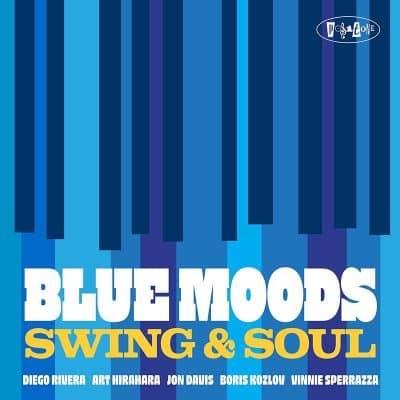Blue Moods Swing & Soul
 Blue Moods
Blue Moods
Swing & Soul
Posi -Tone
We kick off 2024 with Posi-Tone’s super quartet Blue Moods delivering a stirring set of soul-jazz and swing that will invariably evoke the glory years of Blue Note Records. Aficionados may note, though likely covered before that the name “Blue Moods” is a play on hard bop/soul-jazz trumpeter Blue Mitchell’s 1960 Blue’s Moods. This installment features one of the era’s top composers and arrangers, Duke Pearson, who wrote or co-wrote all ten of these compositions, some of which have long been bastions in the jazz canon. Producer Marc Free cites pianist Art Hirahara as the linchpin for the group with his nimble and ever swinging touch on the ivories. Pianist Jon Davis steps in to give Hirahara a break on three tracks while stalwart bassist Boris Kozlov and drummer Vinnie Sperrazza round out the rhythm section. The lead melodic voice is saxophonist Diego Rivera, wielding his expressive tenor saxophone through nine tracks while playing soprano on “Idle Moments.”
It’s rare and ultimately very uplifting to find these Pearson gems together on one album. Consider the iconic versions of these songs – “Idle Moments” (Grant Green), and “Is That So?” (Lee Morgan) merged with such memorable mid-sixties Pearson gems as “Big Bertha,” “Sweet Honey Bee,” and “Ready Rudy.” From the outset this elite quartet executes Pearson’s hard bop tunes admirably. Opening with “ESP” (not to be confused with Wayne Shorter’s “E.S.P,”) the infectious grooves and swinging style is hard to resist. The 1964 original appeared on Pearson’s Wahoo! with this stellar lineup – Donald Byrd on trumpet, James Spaulding on alto sax and flute, Joe Henderson on tenor sax, Bob Cranshaw on bass, and Mickey Roker on drums. In this version listen to the tight, crisp, groove laid down by rhythm section as Rivera blows the kind of soulful lines that evoke Stanley Turrentine or Gene Ammons. The Latin bossa “Chili Peppers” is regarded not only as one of Pearson’s finest and most challenging tunes. It was originally written for an octet and Pearson had plans to do a big band arrangement that never came to fruition. Here, Rivera is of course the single horn but Pearson’s 1968 Blue Note The Right Touch featured parts for Freddie Hubbard (trumpet), Garnet Brown (trombone), and Jerry Dodgion (flute). The medium swinger “Each Time I Think of You” was co-written by Pearson and Donald Byrd and appeared on Byrd’s 1961 Blue Note The Cat’s Walk. Rivera absolutely soars here!
“You Know I Care” is as close to a ballad as we get in this set. Pearson’s original appeared on his 1965 Honeybuns and featured a large ensemble (see “Is That So?”) The original featured a rubato piano intro from Pearson, delivered more briefly here by Jon Davis, in the first of his three stints. “Idle Moments,” rendered here in a concise five minutes in comparison to the legendary Grant Green fifteen-minute original, has long been considered guitarist Green’s finest moments of record. The song is the title track of Green’s 1965 Blue Note classic that also featured Joe Henderson, Bobby Hutcherson, Pearson, Bob Cranshaw, and Al Harewood. Hirahara sparkles here and Rivera’s soprano just weaves the Latin melody gorgeously.
Producer Free selected four tunes from Pearson’s 1967 Blue Note album Sweet Honey Bee – the title track, “Gaslight,” “Ready Rudy,” and arguably the best of the four – “Big Bertha.” Pearson’s lineup included trumpeter Freddie Hubbard, altoist James Spaulding, Joe Henderson on tenor, bassist Ron Carter, drummer Mickey Roker, and the pianist/leader. Pianist Davis plays “Sweet Honey Bee” while Hirahara is in the chair for the other three. You’ll note the difference in styles as Hirahara’s unmatched fluidity contrasts with a heavier, more chord driven approach by Davis who also plays on one of Pearson’s most covered tunes, “Is That So?” that appeared on Pearson’s Honeybuns with this lineup – Pearson (p), Johnny Coles (trp), Garnett Brown (trb), Les Spann (flute), James Spaulding (as), George Coleman (ts), Pepper Adams (bs), Bob Cranshaw (b), Mickey Roker (d). The tune was recorded before Pearson by Lee Morgan and that version tends to be the better known of the two.
This Posi-Tone quartet embodies the aptly titled “Swing and Soul” and deftly navigates Pearson’s tunes, most of which were written for much larger ensembles. That is a testament to the musicianship of Hirahara, Rivera, Davis, Kozlov, and Sperrazza. If you love that classic Blue Note ‘60s sound, you’ll be more than satisfied.
- Jim Hynes
Buy Us a Cup of Coffee!
Join the movement in supporting Making a Scene, the premier independent resource for both emerging musicians and the dedicated fans who champion them.
We showcase this vibrant community that celebrates the raw talent and creative spirit driving the music industry forward. From insightful articles and in-depth interviews to exclusive content and insider tips, Making a Scene empowers artists to thrive and fans to discover their next favorite sound.
Together, let’s amplify the voices of independent musicians and forge unforgettable connections through the power of music
Make a one-time donation
Make a monthly donation
Make a yearly donation
Buy us a cup of Coffee!
Or enter a custom amount
Your contribution is appreciated.
Your contribution is appreciated.
Your contribution is appreciated.
DonateDonate monthlyDonate yearlyYou can donate directly through Paypal!
Subscribe to Our Newsletter
Discover more from Making A Scene!
Subscribe to get the latest posts sent to your email.














































